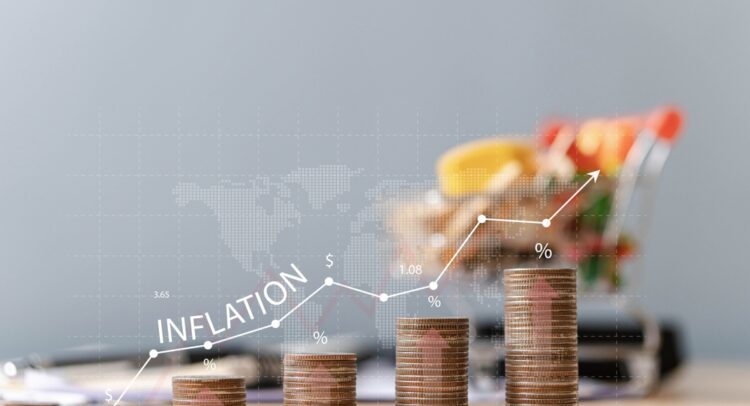Inflation is defined as the increase in prices from one year to the next. It impacts your personal finances, raising prices at the grocery store and, indeed, throughout the economy. So, how should you think about investing during times of high inflation?
Elevate Your Investing Strategy:
- Take advantage of TipRanks Premium at 50% off! Unlock powerful investing tools, advanced data, and expert analyst insights to help you invest with confidence.
The importance of putting money aside for the future should be a central part of your personal finances, regardless of the overall macroeconomic environment. However, it is always important to understand these external market forces, allowing you to plan accordingly.
What Is Inflation?
Inflation is the increase in prices of goods from year to year. There are two basic types of inflation: cost-push and demand-pull.
A rise in commodity prices and wages will increase the production costs for manufacturing, putting upward pressure on prices. The expenses that impact businesses will be passed along to consumers in the form of higher prices. This is known as cost-push inflation.
The pressures can come from rising consumer demand as well. When consumer spending is high, the demand for goods will increase. This will drive prices up as well, a phenomenon known as demand-pull inflation.
Regardless of the causes, you will feel the direct effects of inflation when you go grocery shopping and when you make your other purchases. You will also feel the impact of inflation when you invest.
How Does Inflation Impact Your Money?
Inflation impacts the market in a number of ways.
The first item to understand is that any cash you keep will lose value. For instance, if inflation is 3% for the year and your cash is sitting in a checking account earning close to 0.0%, the purchasing power of your money will have gone down by 3%.
For the same reason, investing your money in savings accounts or Certificates of Deposit (CDs) may not be the best approach during times of high inflation. Even if you are able to lock in a decent rate of return, your investment still needs to outpace inflation in order to turn a profit. The same holds true for government and corporate bonds, which offer a pre-determined rate that may or may not outpace inflationary pressures.
Historically, the stock market has outpaced inflation over the years, though even healthy returns on your investments will lose some of their value as inflation takes a bite out of the gains. However, the stock market can drop in any given year, and even those who hold a diverse portfolio might see their wealth decrease on a year-on-year basis.
To rein in inflation, the Federal Reserve will generally raise interest rates (as it has recently) in order to limit inflation to its stated goal of 2% a year. This also has repercussions for your investing decisions.
Where to Invest When Inflation Is High
The best strategies for periods of high inflation have significant overlap with those evergreen strategies that always make sense.
These include diversifying your portfolio, looking at the fundamentals of the individual company you are considering, and taking a long-term, multi-year approach. Index funds and other vehicles offering multiple assets in a single security–such as ETFs and mutual funds–tend to be sensible investments as well.
If you are looking for individual stocks, there are different types of equities that investors can consider. During periods of inflation, similar to times of recession, it is generally a good move to invest in companies that are providing essential services like food, pharmaceuticals, and utilities. In other words, businesses that are likely to attract customers regardless of the economic environment or increases in price.
Other asset classes can make for good inflation hedges as well. These include commodities, whose prices tend to rise commensurate with the overall rate of inflation. In addition, real estate prices tend to go up with inflation as well, making this a good sector to invest in. While purchasing properties is out of reach for many, real estate investment trusts–or REITs–can allow smaller investors to benefit from increasing real estate prices.
Ironically, inflation can make debts easier to pay off, as the true value of the obligation decreases as the value of money falls. For this reason, periods of high inflation can be good opportunities to double down on ridding yourself of debt, even at the cost of investing for the future. However, this only holds true if the interest rate you are paying is fixed. Many debts–such as high-interest credit card debt–have variable interest rates and, therefore, will go up as interest rates increase.
Conclusion: Macro Considerations, Personal Decisions
The macro environment can, and should, factor into your financial decisions. However, the most important consideration is your personal financial circumstances, as well as the overall roadmap you have defined for yourself and your family.
Your personal preferences should be the most consequential consideration. This includes understanding your risk profile, long-term goals, and current spending needs. The rate of inflation can influence your choices. However, at the end of the day it should not determine them.
Learn money management, and use data-driven stock insights with TipRanks.
















